On March 2, Irish America magazine inducted four new members to the Irish America Hall of Fame at the Metropolitan Club in New York. See below for speeches, photos, and more from the exciting awards luncheon.
℘℘℘
Irish America magazine hosted the 2018 Irish America Hall of Fame March 2 in Manhattan, recognizing the diverse and critical work of Irish and Irish American leaders in the United States
The annual awards luncheon, hosted at the Metropolitan Club in New York, saw the induction of two of Irish America’s most dedicated public servants, one of the business world’s premier leaders, and a Broadway star. Former CIA director John O. Brennan, Governor Jerry Brown of California, former Anheuser-Busch president Dennis P. Long, and Tony Award-winner Kelli O’Hara each received a House of Waterford Crystal Lismore Diamond Vase from Irish America co-founder and editor-in-chief Patricia Harty and founding publisher Niall O’Dowd.
Scroll down to read the transcripts of the inductees’ speeches and for video of the ceremony.
Representing the Irish government at the awards ceremony, Consul General of Ireland in New York Ciaran Madden spoke of the honorees’ dedication to public service, singling out John O. Brennan, joking that “apparently he was the only Irishman who President Obama could find who could keep a secret.”
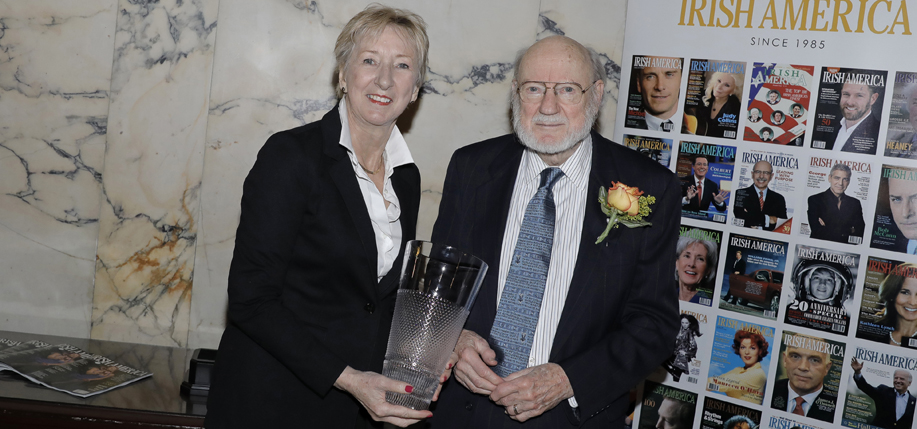
Nobel laureate Dr. William C. Campbell, who was inducted in absentia to the 2017 Irish America Hall of Fame, was also on hand this year to deliver remarks. “I must say that I am amazed to find myself a member of the Irish America Hall of Fame, or indeed any hall of fame,” he said.
“But then, my life has been a series of amazements both in my personal life and in my professional life in industry and in academia. And I often think back to that small town in County Donegal where I grew up – I was in touch by telephone just yesterday to family members there – and I think back to it, it was gratitude and also more and more these days was a sense of shear bewilderment. Thank you very much and congratulations to this year’s inductees.”
Founded in 2010 in celebration of Irish America magazine’s 25th anniversary, the Irish America Hall of Fame honors the extraordinary achievements of Irish-American leaders, from their significant accomplishments and contributions to American society to the personal commitment to safeguarding their Irish heritage and the betterment of Ireland.
The Irish America Hall of Fame is housed at the Dunbrody Famine Ship Experience in New Ross, Co. Wexford. For more information on the Dunbrody Famine Ship Experience, please visit our archives to see a special feature printed in Irish America magazine.
Chairman of Curragh Capital Partners Robert M. Devlin, 2018 New York St. Patrick’s Day Parade Grand Marshal Loretta Brennan Glucksman, and MSNBC anchor Chris Matthews, all past inductees of the Irish America Hall of Fame, were in attendance.
Broadway star Ciaran Sheehan performed at the event, singing two of his greatest hits from Les Miserables –“Bring Him Home” – and Phantom of the Opera – “The Music of the Night.”
Also in attendance were former U.S. Ambassador to Ireland Kevin O’Malley, former director of Central Intelligence (1997-2004) George Tenet, Mutual of America’s Tom Moran and Joe Hummel, Shaun Kelly of KPMG, John Saunders of FleishmanHillard, Kieran McLoughlin of The Ireland Funds, Orla Carey of Tourism Ireland, Susan Black of CIE Tours, and Laura Koumas of 1-800-Flowers.com.
℘℘℘
Dennis P. Long
Dennis P. Long, who served as president of Anheuser-Busch from 1977 to 1987, is the man who brought Budweiser to Ireland in the form of the Budweiser Irish Derby and expanded the reach and popularity of soccer in America through his work in support of the U.S. 1994 World Cup. A life-long St. Louisan, Long is a third-generation Irish American with roots in County Kerry. In 1987, he was awarded the Secretary of Defense Medal for Distinguished Public Service, the highest honor given to a civilian by the Department of Defense. Click here to read Long’s April / May 2018 Hall of Fame profile.
Long was joined at the event by his son, Patrick, with whom he co-owns Sam’s Steakhouse in St. Louis, and granddaughters Allison and Barbara.
I want to thank the Irish America Hall of Fame for allowing the four of us into your special order, with a warm and grateful nod to Patricia Harty and Niall O’Dowd, the Irish America magazine, and John Saunders for his quiet and knowledgeable guidance.
This is incredibly meaningful to me in so many ways. It allows me to publicly tell my son, Patrick, and his daughters, Allison and Barbara, how much I love them. It allows me to thank my friendships who came here from near and far to be here. Each of them has played a special role in my life and in theirs, so I know how difficult it is for them to give up their precious time, so thank you, each and all. And it allows me the opportunity to thank Jesus Christ and his blessed mother for bringing me, and the entire Long clan, into this world as Irish people.
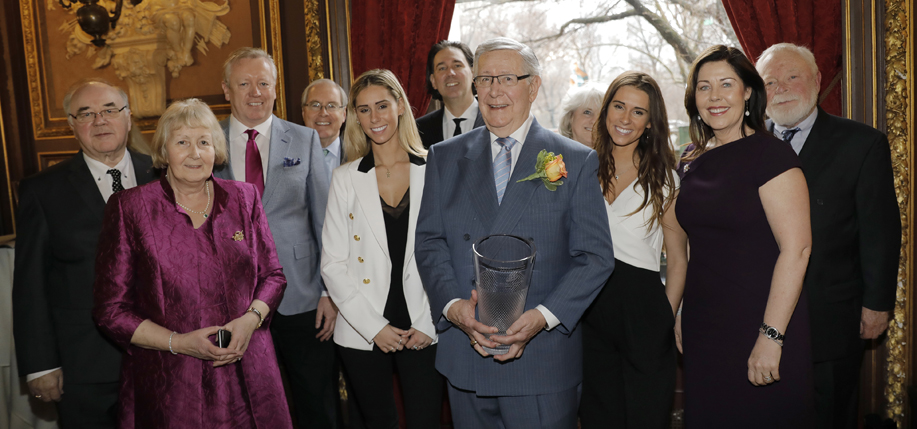
Usually I have so many positive things to say about the role of the Irish heritage and the life involved and why I am so proud of being an Irish American. Instead, I’ll ask you to let a few words trigger your mind’s eye on what our ancestors endured and accomplished during the Famine. So go back to the middle of the 19th century and set your mind on what the Irish called the “recent troubles.” Invaded, degraded, enslaved, exiled, famished, worn, and torn – poor, disease-ridden, desperate farmers sprinkling their crops with holy water searching for one healthy potato. A million souls perished and two million abandoned the land. Most of the exiles came to America on a flotilla of 5,000 boats on a journey that lasted at least four weeks. Coffin ships – typhus, dysentery, tuberculosis, cholera, and the proclamation from one of our keepers that he viewed the Famine as a divine solution to Hibernian overpopulation.
While many died on or because of the trip, an enormous number survived and arrived on our shores, not to open arms, but to signs that said,“Go home,” “Irish need not apply,” “Not welcome.” No one cared that they were not searching for freedom; they wanted food.
And now, 175 years later, they, we, have not only survived; we are thriving, tenaciously and proud. In fact, in generation after generation, our ancestors were moving up the American political and social ladders. Here, in America, those refugees from great hunger strengthened America, fully assimilating in every way except religion and worked with all Americans to help make us the greatest country ever.
Now, while I think we Irish Americans owe it to our ancestors and our country to at least be aware of and knowledgeable of any threats to our American culture and lifestyle, I am optimistic. I’m 82 and my early years were heavily influenced by the great American depression, particularly since I was not to the manner born, and by my Irish American community. While funds were tight, in the Irish fashion we adjusted and quickly learned to be aware of the danger signs and how to cope with the problems. By my teens, America was springing free from the depression and racing off to become the world leader. So I have seen a good part of it. Those who lived through ups and downs – and I have – and there is no doubt in my mind that while we again face problems and differences of opinions, this too shall pass.
We are Americans. And we are the greatest country in the world. Our lessons have been learned and they have made us so much stronger. How do I know? An Irish proverb, and experience on my part supports my position: the older the fiddle (that’s me), the sweeter the song (that’s America). Thank you very much.
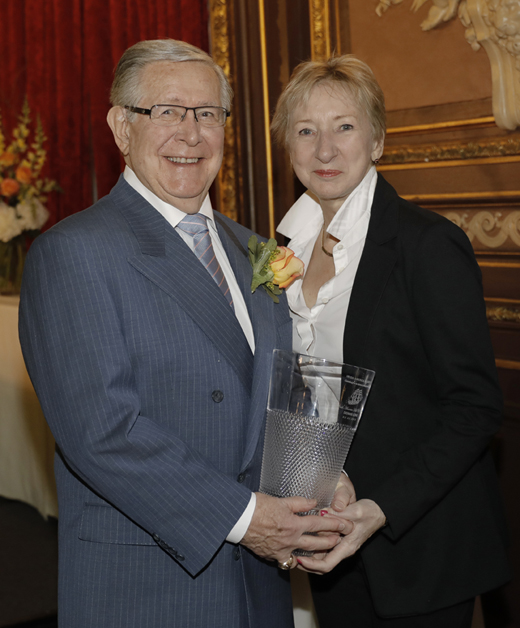
John O. Brennan
A life-long public servant, John O. Brennan spent 29 years with the Central Intelligence Agency, culminating in his appointment as director of the CIA during President Barack Obama’s second term. A first-generation Irish American, Brennan was born and raised in New Jersey to an Irish immigrant father, Owen, from County Roscommon and a first-generation Irish American mother, Dorothy, with roots in counties Mayo and Galway. Click here to read Brennan’s April / May 2018 Hall of Fame profile.
Brennan was joined by his good friend George Tenet, director of Central Intelligence from July 1997 to July 2004.
Thank you very much, Dennis and Patricia and everybody here for this tremendous honor. And, as you mentioned, Niall, this is a tribute to my parents, because as the son of an immigrant, as an individual who grew up in a very proud, lower middle class, blue collar, Irish Catholic family, it was instilled in my brother, Thomas, who is here with me today, and my sister, Kathleen, and I, just what it means to be an Irish American.
Because my father, when he came here in 1948, I remember him telling me the story that I was very, very privileged to be born an American citizen. That he strove for his 28 years to come to the land of opportunity where he could, in fact, raise a family and make a living. But he also told us to never forget our Irish roots, but to also give back to this great country. And I think, Dennis, you said it very, very well. This is the greatest country in the world, and if we look at our history, and our Irishness, our Irish roots, and the Irish who came here, were fundamental to the foundations of this great country and we have much to be proud of.
But also I remember back when we were younger, the lessons that my father, Owen, who died in his 97th year 14 months ago, and then my mother, Dorothy, who died in her 96th year on my father’s 97th birthday, they told us that it was important for us always to live in a manner that we would be proud. I never heard my father say a curse word in my entire life. I never heard him say a falsehood. He epitomized to me the integrity, the truthfulness, the honesty that really should symbolize what it means to be Irish.
And right now, in this day and age here in the United States, I think we need a little bit more of that integrity, that honesty, and that humility that my father, Owen, always instilled upon me and my siblings. And so it is with great humility, as well as with great pride, that I accept this induction. And I must say, the induction of a politician, an actor, a beer baron, and a spy captures the breadth of Irish history. And I was always proud, and I always wanted to make sure that my name, as was stated, is John O. Brennan, because my middle name is Owen, and that is something that I was always proud of.
So again, I am a very proud son of Irish parents and of Ireland’s history and contributions, not just to this country, but to the world. So thank you so much, I appreciate it.
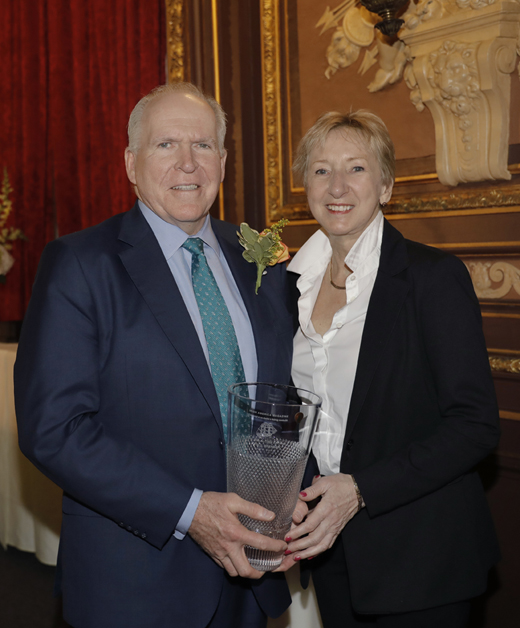
Jerry Brown
Edmund Gerald “Jerry” Brown, Jr., is a four-term governor of the state of California and the longest-serving governor in state history. First elected in 1974, he previously served as California secretary of state and has spent a lifetime in government service, including as mayor of Oakland and attorney general of California. His great-grandfather, Joseph Browne, immigrated from County Tipperary in 1849 at the peak of Ireland’s catastrophic Great Hunger. Click here to read Brown’s April / May 2018 Hall of Fame profile.
Governor Brown was there with his wife, Anne Gust, and joined by his niece, Kathleen Kelly, and other relatives, including his cousins from Ireland, Nora Browne O’Sullivan and her husband John O’Sullivan.
Well thank you. I’m sorry I had to wait to be the oldest governor to get this award. But that probably gives credit to where credit is due, and that is endurance. Endurance pays off. I ran against a lot of people. One of the things that I – I don’t take pleasure in it, but I will take note – of all the people that I ran for governor against in 1974 are dead. And now, almost all the people that ran against me four years later are dead. So, I’m waiting.
Anyway. I’m happy to say that I am happy that I solved the Irish problem through Mr. Clinton, but New York is not a happy memory since I was doing pretty well until Clinton knocked me off in New York. But, you know, that was then, and I’m still in office and he isn’t. So, as Barry Goldwater said, “There is no substitute for victory.”
But the other point I want to say, because I’m the politician not the spy, and not the businessman, but the key thing in politics is timing. My father always told me about that. My father also used to quote Governor Curley, Mayor Curley [Boston Mayor and Massachusetts Governor James Michael Curley] said, you know, “They either carry you out or they throw you out,” so I’m working on that formula. They’re not going to throw me out, I don’t think. Anyway.
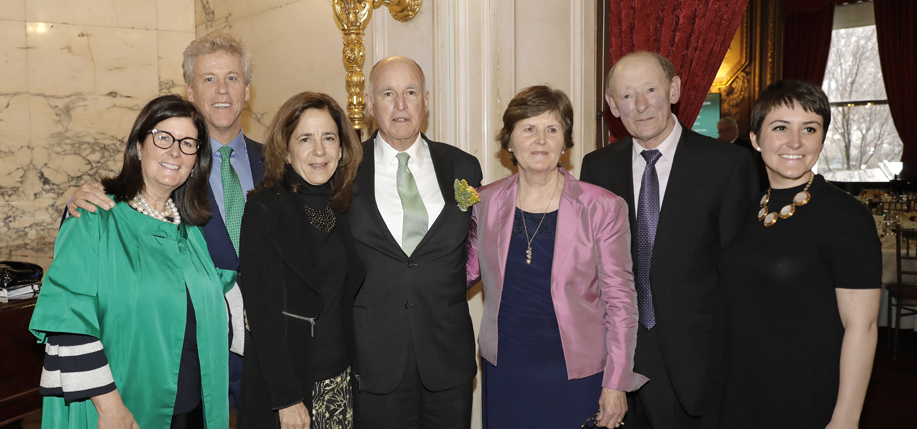
But timing is so, so important. When I ran this third time, and the third time I took over just as the recovery was starting to take hold. And since I’ve been governor, the economy of California has grown every year – 2.8 million jobs, about 750 billion of new economic product in the state, and, of course, I take full credit for that. In fact, when I was elected the first time, there was no Facebook, there was no Google. In fact, there was no Apple when I was first elected Secretary of State, so I take credit for all of that, because they couldn’t have done it if they didn’t have an honest, secure, prosperous government.
Now, that’s not exactly true. But I wanted to think when I’ve listened to stories about Ireland and stories that I always heard growing up, you know, the struggle. And we are in a very – well, we’re in kind of a struggle time, too, with the government being so crazy right now – but I think with all our prosperity, it is always well to remember our roots and the struggle. And I think of that poem of William Butler Yeats, “Easter 1916,” how he ended it, “all are changed, a terrible beauty is born.” This is not all, you know, roses and champagne; there’s a lot of thorns. In fact, one of the things I always like to quote when I can’t think of anything else to say is “ad astra per aspera,” which is Virgil, “to the stars through the thorns.” And I’ve had a few thorns, but I’ve had more stars, and I appreciate that.
And I did have a very Irish upbringing. My father, by the way, was not called Pat, he was Edmund. Edmund Gerald. His great-grandfather was Edmund, as well. But he wanted “Pat” because he was in San Francisco and he knew “Patrick” would be a good name to get the Irish vote, and it worked. It did. But actually, the way he got his name Patrick, he gave a speech in high school about Liberty Bonds, and he ended up saying, “Give me Liberty Bonds or give me death.” He was quoting Patrick Henry. Anyway.
I went to St. Brendan’s grammar school and I learned that St. Brendan was a seafarer who got to America before Columbus. And I was very glad about that. And of course the priest was Father Ryan. The nuns they were all Irish. I thought that was the Catholic Church. And in many ways I was very glad to have been in the pre-Vatican II Pius XII Catholic Church – not that it didn’t have to change, but I got the real deal. And when I was in the seminary we had to speak Latin, we had to be silent most of the time – a very orthodox order. And I like order, because I have basically a chaotic approach to things, and without order I’m really done for. So I appreciate my education at St. Brendan’s – now the high school was a Basque, Ignatius, Ignatius Loyola – but I always associated the church with Ireland, but we were very much about our Irish heritage.
My great-grandfather, when he left Ireland, I think he was a blacksmith in Tipperary – the Kilshane House where we visited. In fact Nora over here, Nora O’Sullivan Browne, with an e at the end, she’s the one who got me here, got the honor, and I’m very glad to be a part of that and feel that connection.
You know, the older you get, the more you have to look back, because there’s more stuff you’ve done. But that heritage, the memories, the exploits, the heroes, the saints, all those things formed my imagination. And as I’ve gone through this political world of chaos and treachery and competition and all the things you know about it, I’ve always kept that clarity, that sense of order. It was most clearer when I was at St. Brendan’s as to what it is today. And that clarity is a base, it’s an order, and we always associated that with our Irish upbringing.
And my great-grandfather, when he got there he was a gardener [Joseph Browne, who immigrated to San Francisco]. And, I guess, because he didn’t make a lot of money, but because he was a gardener he got a very good stone monument down there Holy Cross cemetery. So he’s there, and he has one of the bigger stones. Today these things are incredibly expensive, but back then in 1907 they weren’t. So, he had his son, Edmund Joseph Brown, and then Edmund Joseph Brown had Edmund Gerald Brown, and I’m the Edmund Gerald Brown, Jr. So, there it is.
I haven’t been in a hall of fame before; I’m finally glad to get here. So I don’t know what I do with it – is this a steppingstone or a tombstone? I’d like to think the trajectory is still up. Thank you very much.
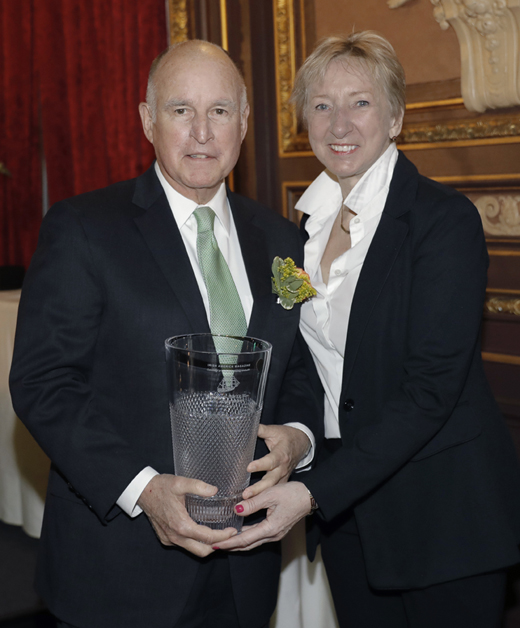
Kelli O’Hara
Broadway star Kelli O’Hara is a six-time Tony Award nominee and winner of the 2015 award for Best Leading Actress in a Musical for her role in The King and I. A fourth-generation Irish American with roots in County Clare, she was born in western Oklahoma and raised on the same farm that has been home to six generations of O’Haras and is today still tended by her uncle and cousins. Click here to read O’Hara’s April / May 2018 Hall of Fame profile.
O’Hara, who dashed over to the Metropolitan Club following a full dress rehearsal at the Metropolitan Opera, closed out the show with a brief speech and two spectacular musical numbers. She was joined by her husband, Greg Naughton. See below for video.
No pressure with that about my voice – I’ll have to do my best today. Indeed, I’m sorry that I’m late. I would have loved to have been here, which was my original plan, until I learned that it was my dress rehearsal this morning at the Metropolitan Opera. So I raced out of all my getup and into this with a splash of green, as much as I could get.
And I’m so – well you have no idea. I’m so honored to be here. Indeed I grew up on that same farm in western Oklahoma where my great-grandfather, my grandfather, and my father before me, and now my uncle is still farming with his son. And just to think about what my grandparents would think about this moment is something I can’t really voice.
I often talked about the sacrifices that I think were made so that I could go off and be a dreamer and move to New York City 20 years ago and fight and dream about a career that is very unusual in my family because we’re all just working people. To think about going and trying to sing on Broadway or be an actor or whatever that is, that was allowed because so many sacrifices were made before me.
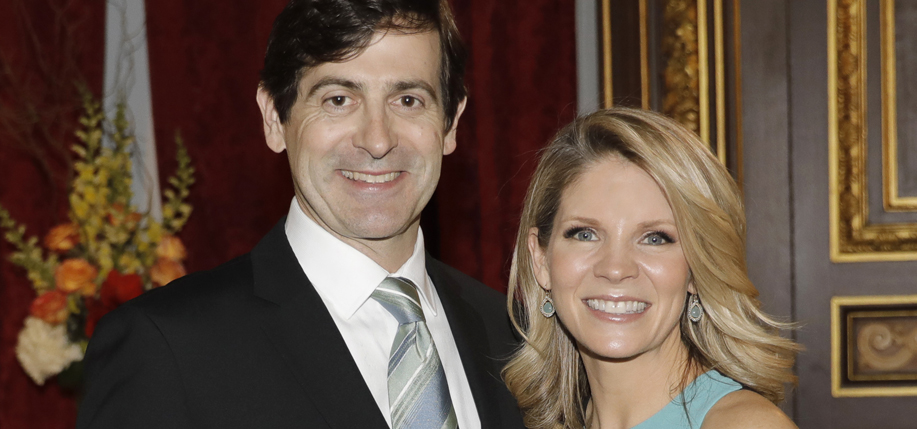
Pete was my great-grandfather. He came with his two brothers to western Oklahoma when land was available. And George, my paternal grandfather, George Henry, farmed that and raised his sons on that farm. I’m going to sing a song today, my second song, about him, and I’m going to talk about that right before I sing it. But before I even sing my first song, I just want to say thank you. I want to tell you how proud I am to be an Irish American, and how I think that what has been instilled in me as far as hard work, pride, family, I think all of those Irish roots have led me to where I am today and it’s teaching me how to raise my own children. I found myself a nice Irish boy to marry – not necessarily looking for it, but boy did it happen to be the nice cherry on top. And when I met him, he said, “Boy, would my grandmother have loved you.” So we fit together nicely.
So, I can sing about things much better than I can speak about them. So I want to get started and sing for you today, but make sure that I’ve given you as much gratitude as I can, because I’m so very, very honored and my parents are so grateful as well to you – Patrick and Laura O’Hara in Oklahoma.
The first song I want to sing isn’t about an Irish immigrant, per se, she’s Italian. But it’s a role that I played on Broadway a couple of years ago in a show called The Bridges of Madison County. And the reason I’ve chosen to sing it is because we pull from things as actors, we pull from experiences of our own, and this woman was a farm wife who came from Naples, Italy, to Iowa to be a farmer’s wife. And every single moment of every show that I played, all I could think about was my Irish grandmother who was a farm wife of George, my grandfather, and what she gave up and then actually received by being that mother and that wife on that farm in the end. And it gave me much joy and pride in singing this song. So this is called “To Build Myself a Home,” and it just means the world to me and I’d like to share it with you.
Thank you so much. I probably should have ended with that one. The reason I’m ending with this one is because it’s very much different, it’s very small and it’s very sweet and I wrote it, so it’s nothing in comparison to a good Jason Robert Brown composition, but it means more to me.
This is called “Here Now.” I wrote this about George Henry O’Hara, my paternal grandfather. And this is a story that I knew from a very early age. George was working on the farm. His father, Pete, became ill. He took over the farm when he was 14 years old. He quit school. He didn’t finish his education, although he was a very smart man and became a big success in his own right on that farm. But the story goes, as my great aunt used to tell me, is he was working out on the field the day he saw what would be his graduating class going to graduation. And I thought about that, and that’s when I talk about the sacrifices. I think about how many opportunities I’ve had – high school, a college education, acting school, New York City – the sky’s the limit because of him, because of that and then what he taught my father. So I wrote this song for him. It’s called “Here Now,” because he used to say, “Here now, here now” when I was making too much noise or turning cartwheels in front of him in the living room. He was trying to get me to calm down. But I kind of took the words, because I remember it so well, and kind of changed it into this “Here Now.” And this is for him and for all of my family, all of my Irish family, and it’s why I’m here today.
Thank you so much.
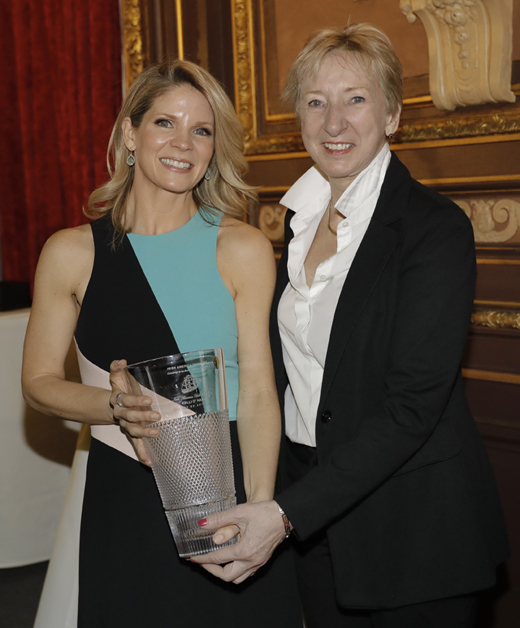
℘℘℘
ABOUT IRISH AMERICA
Since its inception in October 1985, Irish America has become a powerful vehicle for expression on a range of political, economic, social, and cultural themes that are of paramount importance to the Irish in the United States. It has helped reestablish the Irish ethnic identity in the U.S. (34.7 million according to the last U.S. census) and highlights the best political and business leaders, organizations, artists, writers, and community figures among the Irish in America.
SPONSORS
Mutual of America • KPMG • Curragh Capital Partners • Laborers’ International Union of North America • Dooley Car Rentals • Tourism Ireland • House of Waterford Crystal • University College Dublin Michael Smurfit Graduate Business School • The Ireland Funds • 1-800-Flowers.com • CIE Tours International • Department of Foreign Affairs and Trade of Ireland

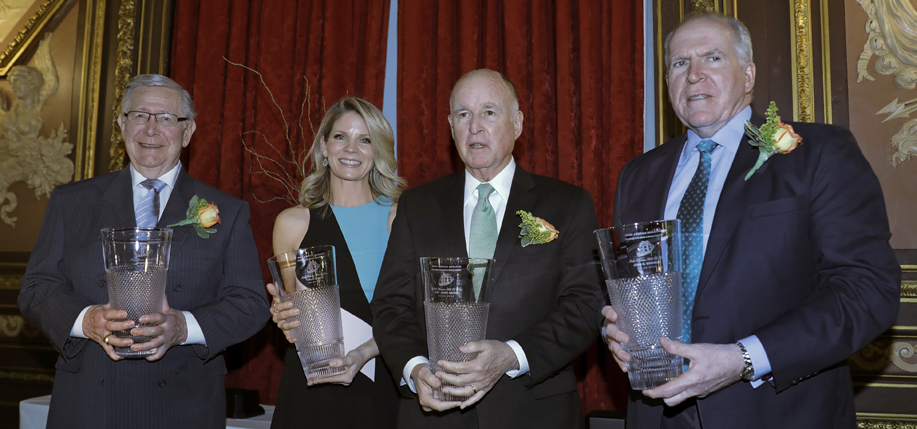
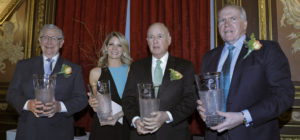
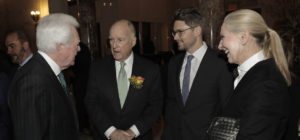
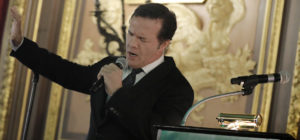
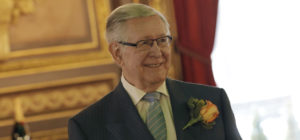
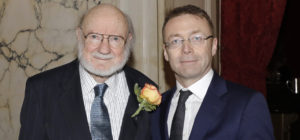
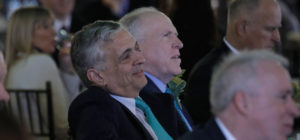
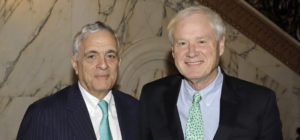
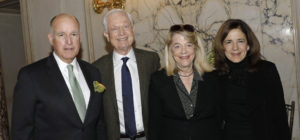
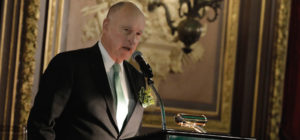
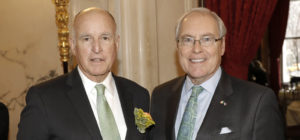
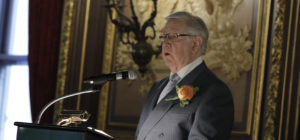
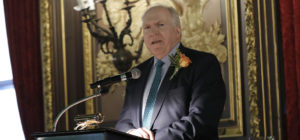
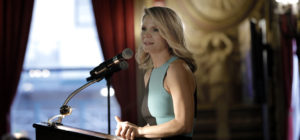
Wow, Ms. O’Hara gets my vote. That grandfather in the field seeing his high school class going to graduation. Her giving his sacrifice credit for her achievement. Beautiful. Thank you.